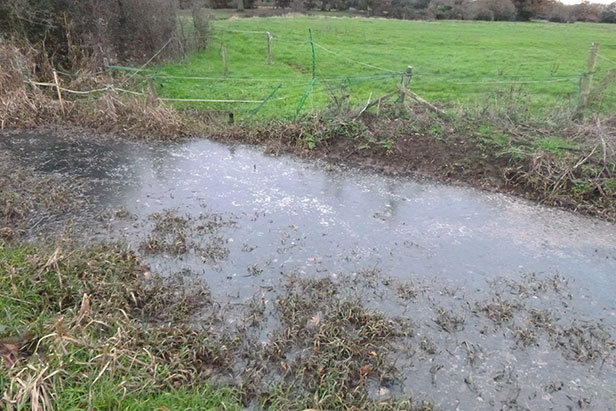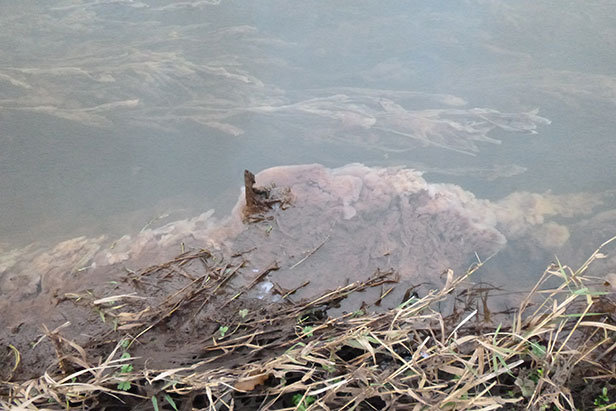
Pool of septic material in ditch
A Dorset waste composting company has been ordered to pay £11,848 in fines and costs for polluting a ditch and river with leachate. The case was brought by the Environment Agency.
At the time of the offence, Eco-Sustainable Solutions Ltd was composting green waste and food waste in two separate operations at its facility at Parley, Christchurch. The food waste was composted in sealed vessels and, as it broke down, produced a highly polluting liquid called leachate.
The composting site is regulated by an environmental permit that states any leachate produced during composting operations must be directed to a foul sewer for treatment at a local sewage treatment works.
On 7 December 2013, the Agency received a report of pollution in the Moors River at East Parley.
An investigating officer found a ditch full of a foul-smelling, black liquid flowing into the river. Aquatic plants in the river downstream of the ditch were covered in a reddish brown sewage fungus for over 3.5 kilometres. The Moors River is a Site of Special Scientific Interest (SSSI).
The pollution was traced to a nearby field where contractors had dug a hole and channel while surveying the site of a new solar park. The hole was discharging a black liquid and positioned directly above two pipes leading from Eco-Sustainable Solutions Ltd.
Checks revealed that the smaller of the two pipes, intended for domestic sewage, had been damaged and contained leachate from the defendant’s in-vessel composting operations as well as domestic sewage. Subsequent investigations revealed that the discharge from the damaged pipe had been going on for over three months.
Eco-Sustainable Solutions should only have used the second pipe to send leachate to a local treatment works as this larger pipe was covered by a trade effluent consent. The illegal discharge is believed to have started in early September 2013 and continued until 7 December, when it was reported by a member of the public.
Tests showed oxygen levels in the ditch and river downstream of the pollution to be seriously depleted and ammonia levels to be far higher than normal. This would have wiped out aquatic life in the ditch and reduced water quality in the river to a dangerous level.
“Leachate from composted food waste is highly polluting and can be toxic to aquatic animals including fish. This was a serious pollution incident that had a significant impact on the environment. As site operator, the defendant has a responsibility to ensure leachate only enters pipework covered by a trade effluent consent,” said Tony Arden for the Environment Agency.
Bournemouth magistrates fined Eco-Sustainable Solutions Ltd £7,500 and ordered the company to pay £4,348 costs after it pleaded guilty, at an earlier hearing, to causing or knowingly permitting a water discharge contrary to Regulations 12(1)(b) and 38(1) of the Environmental Permitting (England and Wales) Regulations 2010. The company was also ordered to pay a £120 victim surcharge. The sentencing hearing was held on Tuesday (24 November).







